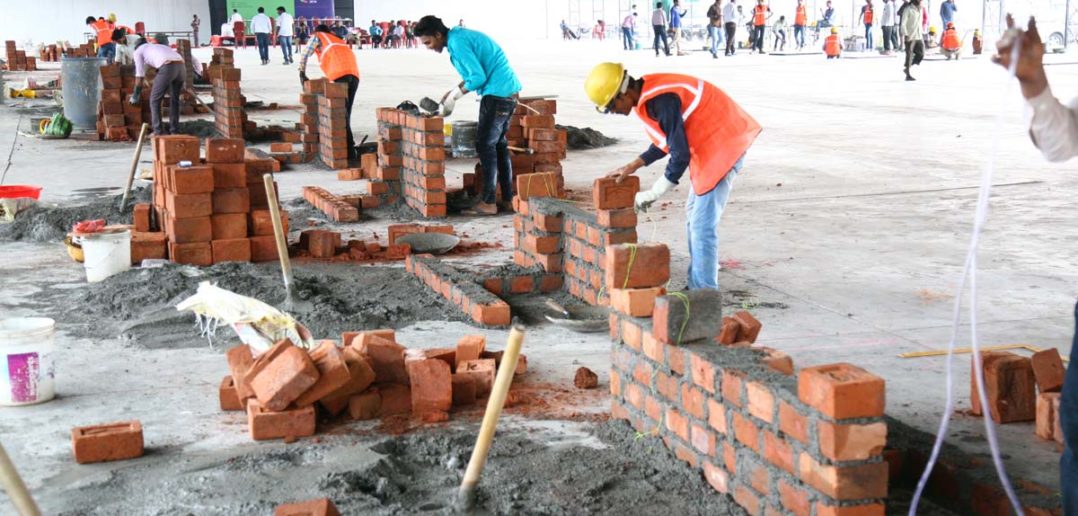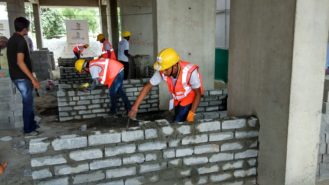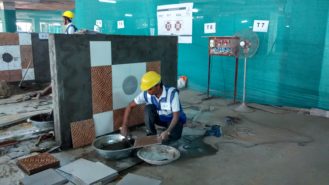Deeply committed to addressing skill deficit in the construction industry, Confederation of Real Estate Developers’ Associations of India (CREDAI), has embarked on many initiatives in training the construction workers. In this Skill Story by Surajit Roy, Head Skilling, CSR & Clean City – CREDAI, we learn about how CREDAI is working with training partners, corporates and CSR projects to bring a positive change in the lives of construction workers across India. This is also a good example of how industry is taking the responsibility of training their workforce as per their requirements.
How it all started with CREDAI’s Kushal program
 In 2012, CREDAI’s Pune Chapter offered a state-of-the-art training program called Kushal. This was in partnership with NSDC. It’s a good example of an on-site skill upgradation program that helps in addressing the issue of workers who are unable to attend training due to loss of wages. This training happened under the direct supervision of the trainers. Later, about two years ago, we decided to expand this training across India when the skill mission was launched in the country.
In 2012, CREDAI’s Pune Chapter offered a state-of-the-art training program called Kushal. This was in partnership with NSDC. It’s a good example of an on-site skill upgradation program that helps in addressing the issue of workers who are unable to attend training due to loss of wages. This training happened under the direct supervision of the trainers. Later, about two years ago, we decided to expand this training across India when the skill mission was launched in the country.
We realised that we need to scale up, so we took this onsite module across the country and we got funded by PNB Housing Finance Ltd. After this, we got funding under the Bridge RPL program of PMKVY2.
 We’ve trained 50,000+ construction workers over the last two years and we want to scale it up to one lakh workers per year. We are now across 30+ cities over 125 sites. With objective assessments and third-party certification, people will gradually look for certified workforce. This is bound to take time since skilling in India will be a movement and not an isolated instance, and CREDAI is an integral part of it.
We’ve trained 50,000+ construction workers over the last two years and we want to scale it up to one lakh workers per year. We are now across 30+ cities over 125 sites. With objective assessments and third-party certification, people will gradually look for certified workforce. This is bound to take time since skilling in India will be a movement and not an isolated instance, and CREDAI is an integral part of it.
Even though construction is an unorganised sector, we work in an organized manner to impact maximum construction workers who are working on site. In fact, CREDAI is the only industry body which has come forward to join the Skill India Mission in this sector. It was also the intent of the government that the industry should come forward because the industry knows the skill deficit and skill gaps for better outcomes.
CREDAI takes training to the work site
Our onsite training is offered in blended format with sessions in the classroom and the work site for a period of 4 weeks. We focus on many technical skills as well as training the workforce in health and sanitation, safety and social skills. The trainees vary from being unskilled and semi-skilled and after attending the program they gain confidence and feel positive about their knowledge and skills and qualify for better wages. This is how we are filling the skill gaps at the entry level, in compliance with the NSQF Qualification Packs (QPs) and National Occupational Standards (NOS).
In the long run, we want to ensure that all the workers are skilled. Hence, we are setting up training centers at source, close to where the workers traditionally come from. We will work with the labour contractors at centers in Murshidabad, Midnapur, Odisha for plumbers and masons and in the states of Telangana, Andhra Pradesh, Karnataka, Chhattisgarh, Gujarat, Jharkhand and Bihar from where construction labour is traditionally sourced.
We talk to the contractors through local training partners and get the workers trained for a month or so and prepare them with the basics of construction requirements. Then, through labour contractors, we engage them in the industry. Some of our initiatives are in coordination with State Skill Missions.
Bridge RPL course under PMKVY2
 Through Bridge RPL programs we are able to successfully convince the developers about the duration and impact of training. We tell them that the workers will be trained and certified in 10 to 12 days of intense training and their skilled will be upgraded. We are trying to capture the effectiveness of training and demonstrate the outcome to the prospective trainees. People who experience the benefits of training go and tell others about the advantages and why they should join. Hence, word of mouth publicity works in attracting more workers.
Through Bridge RPL programs we are able to successfully convince the developers about the duration and impact of training. We tell them that the workers will be trained and certified in 10 to 12 days of intense training and their skilled will be upgraded. We are trying to capture the effectiveness of training and demonstrate the outcome to the prospective trainees. People who experience the benefits of training go and tell others about the advantages and why they should join. Hence, word of mouth publicity works in attracting more workers.
 We believe in gradual interventions so that the contractors and developers are made aware of the benefits of training. Often, they don’t want to train their workers with the fear of attrition, then we educate them about how the ecosystem operates and how training helps in skilling the workforce of the future as well.
We believe in gradual interventions so that the contractors and developers are made aware of the benefits of training. Often, they don’t want to train their workers with the fear of attrition, then we educate them about how the ecosystem operates and how training helps in skilling the workforce of the future as well.
We work with the Construction Sector Skill Council and NSDC and they are very responsive and accessible. We get to discuss issues and practical problems as an industry body. For example, we have told them about the need to add Level 2 training under PMKVY since majority of the training requirements come from this level and not at the level of supervisors, which is just about 20%. I feel through such open dialogue we are building a professional environment for training.
Other supporting initiatives
We are also addressing other issues through support for workers whose children need to be take care of. We’ve tied up with Mobile Creche that runs creches on construction sites. This is a part of PNB Housing CSR initiative and they partner with Akshaya Patra for food and SBI for health check.
CREDAI’s role in Smart Cities project
In the Smart Cities project, we will play a big role in waste management. We have developed a fantastic system which has been a part of clean city movement in Kochi since 2009. This involves the basic process of dealing with domestic solid waste based on the principle of waste segregation at source, the two buckets system that helps in composting the wet waste and recycling the dry waste. In Kochi, we’ve covered close to 1 lakh flats in about 700 apartment complexes and in some other parts of Kerala as well.
This exemplary model also got a mention in Urban Development Ministry’s Manual on Waste Management. We want to export this model everywhere and this is something we will do in addition to skill development. As a pilot project, we want to implement it in 30 cities and impact 1 million houses in the next two years. Initially we will get started with 11 cities, which are the proposed smart cities where we will build this model and we are talking to NGOs to help us and we want to partner with local bodies as well. This is where we will play a huge role in smart cities.













Dear Sir,
we are skill development training programs run in odisha different PIAS. We are Request any CSR programs in ODISHA Please contact me ….